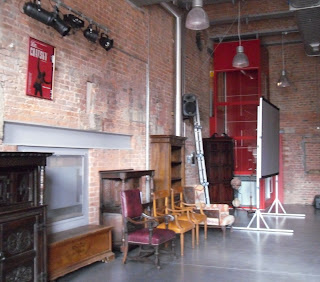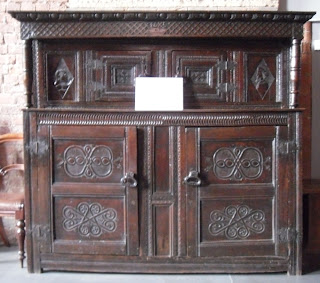The International Anthony Burgess Foundation is at the corner of Cambridge and Hulme streets, Manchester. It states that its mission 'is to encourage and support public and scholarly interest in all aspects of Anthony Burgess's life and work'.
The windows bear several quotations by Burgess: 'Literature is not easy, but without literature we are lost.' Yes indeed.
'The world has much solace to offer: love, food, music, the immense variety of race and language, literature, and the pleasure of artistic creation.'
The room where various events take place, which contains furniture that belonged to Burgess.
And this piece of furniture is an example, with a polite notice asking people not to place glasses on it.
The Reading Room and display cases are downstairs, where we find this introduction to the man:
'ANTHONY BURGESS (1917–1993)
'Anthony Burgess was a prolific force in English letters, working as an author, composer, journalist, translator and teacher in a career spanning over forty years. Though he is best known for his novel A Clockwork Orange (1962), Burgess produced thirty-three novels, twenty-five works of non-fiction, two volumes of autobiography, three symphonies and various other musical works, screenplays for film and television, and an impressive body of journalism, television and radio work, book reviews and interviews.
'Burgess is one of Manchester's most famous writers. Growing up in Harpuhrey and Moss Side, he attended Xaverian College in Rusholme and studied English at the University of Manchester. In later years he lived in Malaya, Brunei, Italy, the United States, Malta and Monaco.
'As the novelist A. S. Byatt has said:
"There were two Anthony Burgesses, perhaps. One was atheist, English, Northern, and interested in the quiddities of the demotic. The other was Catholic, Irish, Latin, and interested in the spiritual life."
'Several major themes connect Burgess's writing, including a preoccupation with Catholism and guilt, experimentation with language and the form of the novel, the role of the artist in society, the relationship between literature and music, and the humorous treatment of human foibles. Burgess's conviction that art should represent the clash of opposites - darkness and light, good and evil, Eastern and Western cultures - informs much of his fiction. He was a voracious reader, and significant influences on his writing include James Joyce, Gerard Manley Hopkins, and D. H. Lawrence.'
'LIANA BURGESS (1929–2007)
'Liliana Macellari Burgess was born in Porto Civitanova, in the Marche region of Italy. She was the daughter of Gilberto Macellari, a photographer and actor, and the Contessa Maria Lucrezia Pasi della Pergola.
'Liana was the Italian translator of Lawrence Durrell and Thomas Pynchon, and read and admired Burgess's novels Inside Mr Enderby and A Clockwork Orange. Burgess and Liana met in Chiswick in 1963, while she was teaching linguistics at Cambridge University, and married in 1968. Liana was Burgess's greatest source of support, acting as his literary agent, translator and collaborator.
'Liana Burgess established the International Anthony Burgess Foundation in 2003 to encourage and support public and scholarly interest in all aspects of Anthony Burgess's life and work.'
'Sixtieth anniverary of the Malay College, Kuala Kangsar (1905–1965).'
'Anthony Burgess taught as an education officer in the British Colonial Service between 1954 and 1959. While living in the East, he published the three novels that are now collected as The Malayan Trilogy: Time for a Tiger, The Enemy in the Blanket, and Beds in the East.
'What sets Burgess apart from other colonial authors is his use of other languages in his works. During his posting to Kuala Kangsar, Burgess was determined to learn the Malay language:
'"There was a very large princely vocabulary and it had to be learned. [...] [L]essons took place on the verandah of the King's Pavilion while mosquitoes zoomed and struck and flying beetles boomed, copulated, shed their wings and died." (Little Wilson and Big God), pages 383–4)'
'Anthony and Liana Burgess. Malay language cards for the glossary of The Malayan Trilogy (1980).'
'Anthony Burgess, handwritten fragment of MF.
'"Bill Conrad, back at Warner Brothers, had facetiously suggested putting on a black Oedipus and calling it Mother-Fucker. My initials of that book were a homage to that idea, but they also stood for the hero, Miles Faber, who summed up man by being both a soldier and an artificer. The plot was based on incestuous relationships, but as seen through the lens of Lévi-Strauss's Structuralism." (You've Had Your Time, page 268)'
'Burgess collected tarot and playing card decks. In his hand-drawn James Joyce deck, he modifies the suits of traditional playing card, in order to better suit Joyce's literary landscape. "Hearts" are changed to "Kidneys", "Spades" to "Ashplants", "Clubs" to "Shamrocks", and "Diamonds" became "Flowers of the Mountain". The face cards represent some of Joyce's best-known characters: Leopold Bloom, Molly Bloom, Stephen Dedalus, and the brothers Shem and Shaun.'
'Will and Testament: A Fragment of Biography by Anthony Burgess with eight screenprints by Joe Tilson. (Verona: Plain Wrapper Press, 1977).
'Will and Testament is Anthony Burgess's most lavishly and most beautifully presented work - a limited edition run of 86 folio-sized copies, printed on a Washington hand-press by Plain Wrapper Press of Verona.' The work is housed in a wooden box, bound in leather and printed on handmade paper with calligraphic embellishments. Each copy is signed by both Burgess and Tilson.'
'The short story reworks Rudyard Kipling's 'Proofs of Holy Writ', and imagines that William Shakespeare casually inserted his name into Psalm 46 of the St James Bible.'
1. Olivetti lettera 35
2. Olympia Traveller de Luxe
3. Olivetti lettera 25
4. Olympia Splendid 66
5. Hermes Rocket
'I have earned my living with a typewriter for the last twenty-five years years, and I have developed a love for the instrument analogous to my love for my old Gaveau piano, which once belonged to Josephine Baker. But whereas a piano, once acquired, becomes a permanent article of furniture, typewriters break down irreparably and have to be replaced. Yet the old loved name – Qwert Yuiop – reappears and proclaims a continuity of identity, minimally modified when it gets into Italy or France and becomes Qzert Yuiop. Without Qwert Yuiop's willingness to submit to my punishing fingers I doubt if I could have sustained the profession of author.'
(Anthony Burgess, from Homage to QWERT YUIOP, 1986)
Burgess's harpsichord, with a very reasonable notice about seeking permission to use.
Burgess with his son Andrew Burgess Wilson.
'Anthony Burgess. Handrawn 15th birthday card to Andrew Burgess Wilson, 9 Aug 1979.'
'Andrew Burgess Wilson was proud of his Scottish heritage, and studied the traditional music and instruments of Scotland from a young age. Anthony Burgess celebrates his son's love of Scottish music [...] complete with bagpipes, a birthday fanfare, and a poem.'
'Letter to Andrew Burgess Wilson from Anthony Burgess with musical signature, 5 May 1981.
[...]
'Andrew Burgess Wilson and Anthony Burgess's relationship was strengthened by their shared love of music. In this letter to his son, Burgess mentions the forthcoming performance of his Glasgow Overture, his idea for the book This Man and Music [London: Hutchinson, 1982], and laments that there is no profit to be made from serious music, signing off with a handwritten stave.'
Anthony Burgess's interest in writing music for instruments in the recorder family, especially the great bass recorder, was prompted by his son Andrews's passion for these instruments.
I really enjoyed my visit to the International Anthony Burgess Foundation, and just wish he were more recognized today. The IABF's website is here.

























3 comments:
Yes, correctly.
Nicely written article on Burgess. One small addendum- The instrument pictured above is not a harmonium, but is a harpsichord.
Thanks for the correction, Chad. I've no idea how I came to write either word, as I clearly haven't a clue about identifying either instrument. I'll have to have a Google.
Post a Comment